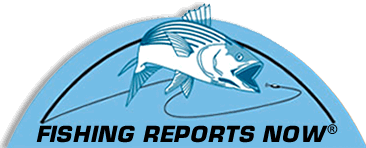President Pens
Executive Order
On Striped Bass
Executive Order
On Striped Bass
From Tom Fote from the Jersey Coast Anglers Association:
PRESIDENT SIGNS EXECUTIVE ORDER ON STRIPED BASS AND RED DRUM
I was invited by the President to witness this signing of an Executive Order but could not make it. JCAA has been working on striped bass no sale for over 20 years and I have been working on it for over 30 years. It is nice to see that President Bush recognizes the importance of conserving striped bass and red drum and protecting the recreational community that depends on these fish. The EEZ is currently closed for striped bass fishing so there is no real impact there. The Executive Order and the press release are below the Executive Order that was signed by President George Bush on Saturday, October 20th. It directs the revision of current regulations, as appropriate, to include prohibiting the sale of striped bass and red drum caught within the Exclusive Economic Zone of the United States off the Atlantic Ocean and the Gulf of Mexico the sale of striped bass and red drum from the EEZ. However, this Executive Order also recommends that the states consider no sale status for these two fish. It will be interesting to see how the states and ASMFC react. There is also a bill sponsored by Congressman Frank Pallone with many cosponsors including Congressman Thomas Allen from Maine that would make striped bass a gamefish (no-sale) by Federal Legislation. The value of Federal Legislation is that the solution is more lasting and less dependent on the current President. It would also address state waters. It will be interesting to see if this Executive Order provides any motivation to move this bill. The Executive Order and the press release are below.
Sincerely,
Tom Fote
Executive Order:
Protection of Striped Bass and Red Drum Fish Populations
White House News
President Bush Signs Executive Order
To Protect Striped Bass and Red Drum Fish Populations
By the authority vested in me as President by the Constitution and the laws of the United States of America, to assist in ensuring faithful execution of the Magnuson Stevens Fishery Conservation and Management Act, the Atlantic Coastal Fisheries Cooperative Management Act, and the Atlantic Striped Bass Conservation Act (chapters 38, 71, and 71A of title 16, United States Code), and to conserve striped bass and red drum fish, it is hereby ordered as follows:
Section 1. Policy. It shall be the policy of the United States to conserve striped bass and red drum for the recreational, economic, and environmental benefit of the present and future generations of Americans, based on sound science and in cooperation with State, territorial, local, and tribal governments, the private sector, and others, as appropriate.
Sec. 2. Implementation. (a) To carry out the policy set forth in section 1, the Secretary of Commerce shall:
(i) encourage, as appropriate, management under Federal, State, territorial, tribal, and local laws that supports the policy of conserving striped bass and red drum, including State designation as gamefish where the State determines appropriate under applicable law;
(ii) revise current regulations, as appropriate, to include prohibiting the sale of striped bass and red drum caught within the Exclusive Economic Zone of the United States off the Atlantic Ocean and the Gulf of Mexico;
(iii) periodically review the status of the striped bass and red drum populations within waters subject to the jurisdiction of the United States and:
(A) take such actions within the authority of the Secretary of Commerce as may be appropriate to carry out the policy set forth in section 1 of this order; and
(B) recommend to the President such actions as the Secretary may deem appropriate to advance the policy set forth in section 1 that are not within the authority of the Secretary.
(b) Nothing in this order shall preclude or restrict the production, possession, or sale of striped bass or red drum fish that have been produced by aquaculture.
(c) The Secretary of Commerce shall implement subsections 2(a)(i) and (iii), insofar as they relate to Atlantic striped bass, jointly with the Secretary of the Interior, as appropriate.
Sec. 3. Definitions. As used in this order:
(a) "Exclusive Economic Zone of the United States" means the marine area of the United States as defined in Presidential Proclamation 5030 of March 10, 1983, with, for purposes of this order, the inner boundary of that zone being a line coterminous with the seaward boundary of each of the coastal States;
(b) "red drum" means the species Sciaenops ocellatus; and
(c) "striped bass" means the species Morone saxatilis.
Sec. 4. General Provisions. (a) This order shall be implemented in a manner consistent with applicable law (including but not limited to interstate compacts to which the United States has consented by law, treaties and other international agreements to which the United States is a party, treaties to which the United States and an Indian tribe are parties, and laws of the United States conferring rights on Indian tribes) and subject to the availability of appropriations.
(b) Nothing in this order shall be construed to impair or otherwise affect the functions of the Director of the Office of Management and Budget relating to budget, administrative, and legislative proposals.
(c) This order is not intended to, and does not, create any right or benefit, substantive or procedural, enforceable at law or in equity by a party against the United States, its departments, agencies, instrumentalities, entities, officers, employees, or agents, or any other person.
GEORGE W. BUSH
THE WHITE HOUSE,
October 20, 2007.
# # #
For Immediate Release
Office of the Press Secretary
October 19, 2007
Fact Sheet:
Guarding Against Over-Fishing
Through Cooperative Conservation
White House News
President Bush Signs Executive Order
To Protect Striped Bass and Red Drum Fish Populations
President Bush Signs Executive Order
Encouraging Conservation
Of Two Of America's Most Popular Recreational Fish
On Saturday, October 20, President Bush visited the Chesapeake Bay Maritime Museum in St. Michaels, Maryland, to sign an Executive Order to protect America's striped bass and red drum fish populations. Recreational fishing is important to sportsmen and women, to America's families, and to our economy recreational fishers spend more than $40 billion a year. Striped bass and red drum are two of our Nation's most popular recreational fish; yet while they were once abundant in America's waters, they have been over-fished.
The Executive Order the President signed sets a policy to conserve striped bass and red drum fish for the recreational, economic, and environmental benefit of present and future generations of Americans.
The Executive Order:
1. Moves to prohibit the sale of striped bass and red drum caught in Federal waters. The Order directs the Departments of Commerce and Interior to work with Federal and State officials on our fishery management councils and commissions to prohibit the sale of striped bass and red drum caught in Federal waters.
2. Promotes more accurate scientific records about fish population levels. The Order encourages the periodic Federal review of the status of striped bass and red drum populations to ensure that we have the most up-to-date information for determining whether breeding stocks are attaining healthy numbers and size in Federal waters.
To improve the quality of our data, we are building a recreational saltwater registry that will collect information from sportsmen about local fish stocks, which will help us better protect striped bass, red drum, and all our fisheries.
3. Helps the Federal government work with State and local officials to find innovative ways to conserve these species for future generations. The President is directing Federal agencies to work with State officials, while respecting the States' role in the management of the natural resources under their care, to find innovative ways to help conserve striped bass and red drum populations, including the use of the State designation of "gamefish," where appropriate, to prohibit commercial sales of the fish.
The Executive Order is based on the Administration's policies of cooperative conservation and responsible stewardship. To meet the environmental challenges of the 21st century, the President believes we must bring together conservationists, sportsmen, local leaders, and Federal, State, and tribal officials in a spirit of cooperation to protect and preserve our Nation's natural heritage.
Saturday's Action Will Advance The Administration's Efforts To End Over-Fishing In America, Replenish Our Nation's Fish Stocks, And Advance Cooperative Conservation And Responsible Stewardship
In 2004, the President released his Ocean Action Plan to promote responsible use and stewardship of our ocean and coastal resources. The plan focused on making our oceans, coasts, and Great Lakes cleaner, healthier, and more productive.
In 2006, the President signed an Executive Order establishing the Papahanaumokuakea Marine National Monument in the Northwestern Hawaiian Islands. This action created the largest conservation area in the history of our Nation, and the largest protected marine area in the world.
In January, the President signed the Magnuson-Stevens Fisheries Conservation and Management Act. This legislation has set a deadline to end over-fishing in America, which occurs when we catch fish from a species at a rate faster than they are reproducing, by 2011, and has authorized "limited access privilege programs" to set market-based incentives to help replenish our fish stocks. In 2005 the President set a goal to double the number of these programs by 2010, and we are on target to meet that goal.
In February, the President released his 2008 Budget, which included a $143 million Oceans Initiative to support the Ocean Action Plan priorities. The Oceans Initiative provided $38 million to protect and restore coastal and marine areas, including $8 million for the Papahanaumokuakea Marine National Monument; $25 million to end over-fishing and ensure sustainable use of ocean resources, including $6 million to implement Limited Access Privilege Programs; and $80 million to advance ocean science and research.
Major improvements have been made in the management of our Nation's marine fisheries. Important stocks such as Atlantic sea scallops and swordfish have been returned to productive levels. Since 2001, 29 stocks have been removed from the over-fished list, and rebuilding plans are in place for the more than 90 percent of the remaining over-fished stocks.
In addition to these efforts to end over-fishing, we are implementing a strategy to improve, restore, and replace three million acres of wetlands. These wetlands act as "nature's nurseries" by helping small fish survive and grow before they head to deeper waters.
We are working in our coastal areas to tackle the problem of marine debris, such as abandoned nets, which can destroy fish habitat. Next month we will announce a new strategy to deal with marine debris.
We will:
Work with the private sector to clean up marine debris.
Educate the public on what they can do to prevent its spread.
Work with our partners in the international community to help stop marine debris from being dumped into oceans and waterways in the first place.
We are encouraging other nations to follow our lead and end destructive fishing practices such as bottom trawling on coral reefs and the use of explosives and chemicals.





